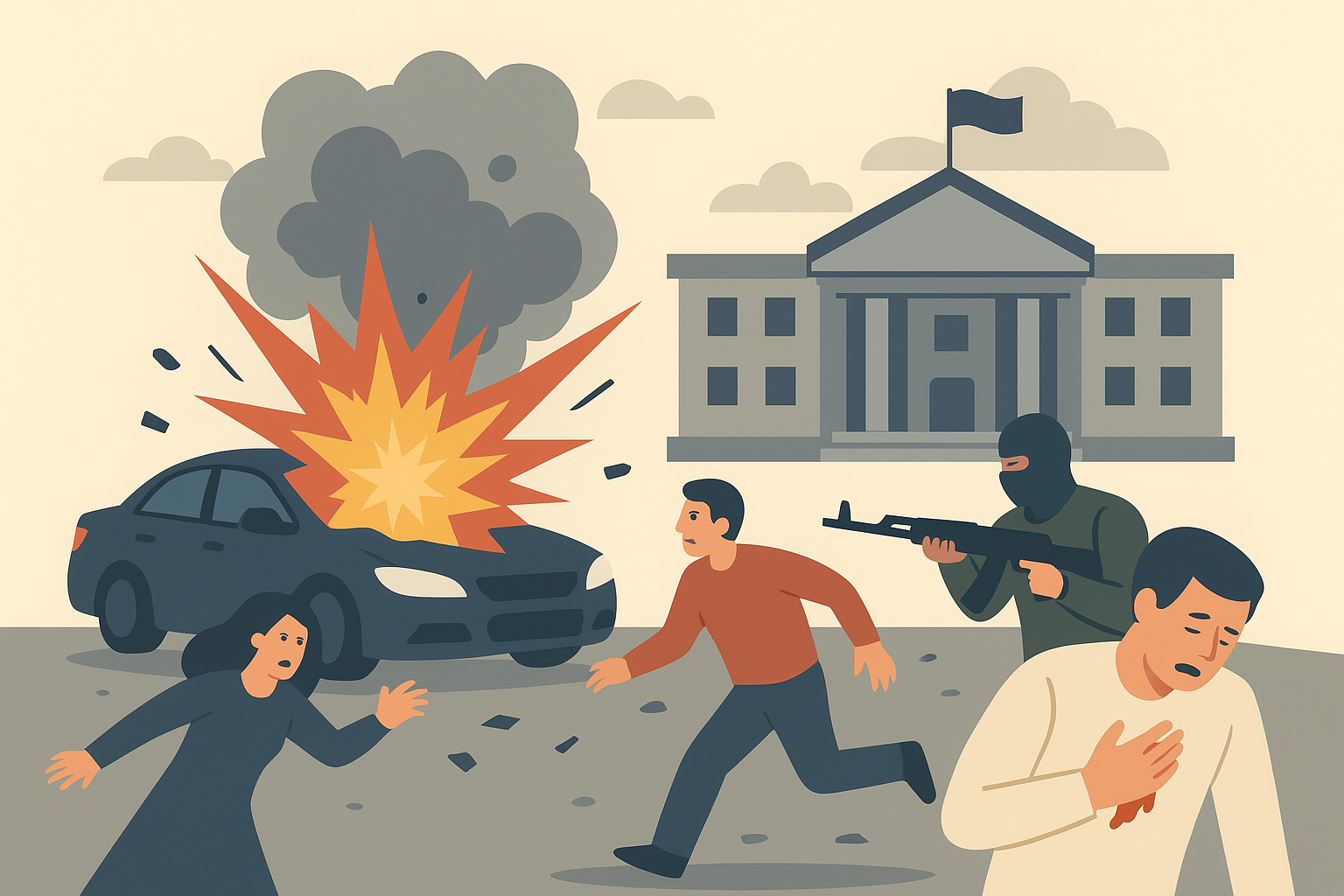Last Updated: September 30, 2025, 10:25 PM

Pakistan bomb blast has become a repeated headline in recent years, drawing global attention to the fragile security situation of the country. Each incident not only causes tragic loss of life but also highlights deep-rooted political and social challenges. The most recent attack shook Quetta, where a car packed with explosives detonated near a Frontier Constabulary headquarters, killing civilians and security personnel alike. This single pakistan bomb blast reflects decades of unrest that still haunt the nation today.
The Rising Frequency of Pakistan Bomb Blast Incidents
Over the past decade, the phrase pakistan bomb blast has sadly turned into a recurring tragedy. From marketplaces to schools, mosques to government compounds, militants have repeatedly targeted both civilians and institutions. The Quetta bombing is only the latest in a long series of attacks. Militants linked to separatist movements and extremist groups often take responsibility for these assaults, aiming to spread fear and weaken confidence in the state.
Statistics reveal that the number of casualties from each pakistan bomb blast varies, but the psychological impact is always immense. Families lose loved ones, children are left traumatized, and survivors carry physical and emotional scars. Each blast reminds citizens that their safety remains uncertain despite government assurances of stronger security. International observers also note that every pakistan bomb blast complicates the nation’s image abroad, making foreign investment and tourism more difficult.
Government Response After Every Pakistan Bomb Blast
Whenever a pakistan bomb blast occurs, the immediate government response follows a predictable pattern: cordoning off the area, launching investigations, and announcing compensation for the victims’ families. Security forces claim victories by neutralizing attackers or destroying militant hideouts, but the cycle continues. Despite repeated promises of reforms, the structural problems remain.
One critical issue exposed by every pakistan bomb blast is the lack of coordination among intelligence agencies. Although local police, military, and paramilitary forces work together, lapses still allow militants to plan and execute attacks. Political instability further complicates long-term planning, as governments change and policies shift frequently. After the Quetta incident, many analysts argued that unless Pakistan strengthens counter-terrorism frameworks and invests in intelligence gathering, the pakistan bomb blast headlines will continue to dominate the news.
Public frustration grows after every pakistan bomb blast because citizens see the same cycle repeated. Leaders visit hospitals, condemn terrorism, and announce aid, yet little changes in the long run. Civil society groups have demanded not only stronger laws but also better education, economic opportunities, and social reforms to address the root causes that drive young men into militancy.
The Human Cost of Every Pakistan Bomb Blast
Beyond numbers and reports, the pakistan bomb blast story is ultimately about people. Families are torn apart in seconds, children lose parents, and communities live under constant fear. Survivors often describe the deafening noise, flying debris, and chaos that follow each explosion. Hospitals struggle with sudden waves of injured victims, highlighting weaknesses in healthcare infrastructure as well.
Journalists covering the aftermath of a pakistan bomb blast often share heartbreaking images of grieving families waiting outside morgues, hoping their loved ones survived. Psychological trauma runs deep in these communities, where normal life rarely returns to what it was before. Mental health experts stress that the damage from repeated pakistan bomb blast incidents cannot be measured in death tolls alone—it lingers for generations.
The international community has expressed sympathy and offered assistance, but critics argue that Pakistan needs to look inward. Terrorist groups thrive in environments where poverty, unemployment, and lack of education leave young men vulnerable to radical ideologies. Unless these deeper issues are tackled, the human suffering caused by every pakistan bomb blast will continue unchecked.
Looking Ahead: Can Pakistan End the Bomb Blast Cycle
The key question is whether Pakistan can break free from the cycle of violence symbolized by the term pakistan bomb blast. Experts suggest a multi-pronged strategy: improved intelligence sharing, stronger law enforcement, community-based programs, and international cooperation. Beyond security measures, Pakistan must invest in education and job creation to steer its youth away from extremist recruiters.
The global community also plays a role in ensuring that support is provided to victims and that the networks funding terrorism are cut off. Regional peace efforts, particularly with neighboring countries, could reduce cross-border militancy that often fuels such violence. However, without political will and consistent implementation, each future pakistan bomb blast risks undoing years of progress.
Citizens hope for a day when news channels will not lead with the words pakistan bomb blast, but with stories of growth, stability, and peace. Until then, the nation remains trapped in a cycle where tragedy strikes too often, and resilience is tested every single time. The recent attack in Quetta is a painful reminder of how much still needs to be done.
- A car bomb exploded near a paramilitary headquarters in Quetta
- At least 10 people were killed and 30 injured
- Both civilians and security personnel were among the victims
- Militant groups often claim responsibility
- Separatist outfits in Balochistan frequently target security forces
- Some attacks are linked to extremist networks with regional ties
- At least 10 deaths were confirmed
- More than 30 individuals were reported injured
- Hospitals in Quetta struggled with the sudden influx of patients
- Insurgency and militancy in conflict regions
- Political instability weakens long-term security measures
- Cross-border militancy and radicalization play major roles
- Authorities secure the blast site immediately
- Investigations are launched to track perpetrators
- Compensation is announced for victims’ families
- Heavy civilian casualties and displacement
- Long-term psychological trauma for survivors
- Communities live in fear of repeated attacks
- Experts recommend stronger intelligence networks
- Improved counter-terrorism operations are needed
- Addressing poverty and extremism is key to lasting peace
